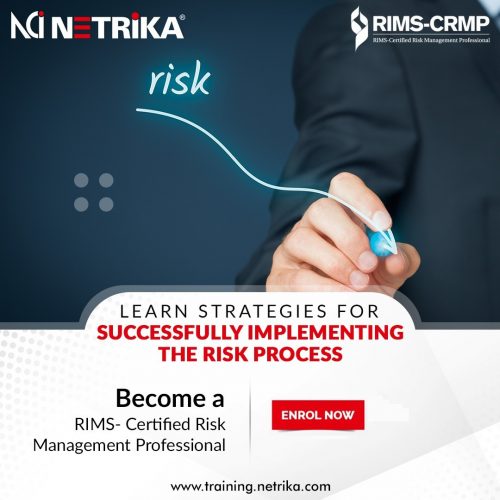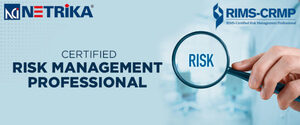-
 Find in Members
Find in Members Find in Videos
Find in Videos Find in Channels
Find in Channels
This website uses cookies to ensure you get the best experience on our website.
To learn more about our privacy policy Click herePrivacy Preference
-
- Last updated September 11, 2023 0 comments, 119 views, 0 likes
More from Netrika Counsulting
More in Politics
Related Blogs
Risk management courses - Netrika
Body
Certified Risk Management Professional
Risk management courses provide essential knowledge and skills to professionals across various industries to identify, assess, and mitigate risks effectively. These courses cover topics such as financial risk, cybersecurity, operational risk, compliance, and strategic risk management.
Risk management courses equip individuals with skills to identify, assess, and mitigate risks across various domains, making them valuable for career growth and enhancing organizational risk resilience
Enterprise risk management certification is a concocted process that incorporates methods and strategies to manage, monitor, and seize opportunities that assist a risk framework. Organizations typically align risk management identifying targeted events relevant to their objective of threats and assessing them through their likelihood and impact.
Enterprise risk management certification is driven towards creating a risk-based approach to managing a business, integrating the concepts of internal control, and strategic planning and addressing the broad spectrum of risks permeating the system. The risk certification course describes a streamlined approach for specialists to respond to and monitor internal and external organizational environment risks.
The strategic tasks incorporated under the enterprise risk management certification strategy include:
- Avoidance of the existing activities that are breeding rise
- Reduction in time taken to minimize the likelihood of risk-related activities
- Alternative Actions toward identifying, deciding and considering the feasible options that can minimize risks
- Share/Insure a portion of the risk to finance it
- Accept in situations when no action is taken, which might be due to a monetary decision

How important is a certified risk management certification for professionals?
The profile of a risk management professional with CRMP certification course credentials incorporates mitigating the potential risks for organizations. These risks could be a natural, legal, monetary or reputational loss. Certified risk professionals are assigned to identify and assess the risks, with the best possible solutions, causing minimum impact to the business.
Considering the criticality of the risk management profile, the certification garners great value for not just the organization to ascertain a quality approach for mitigating risk, but also for the professional to achieve a wider platform in exploring and addressing the learnt capabilities. Moreover, the enterprise risk management certification also ensures more credibility amongst the risk management community.
When seeking career advancement in the risk domain, the enterprise risk management certification is exactly the kind of credential that acts as a gold standard in a professional’s journey. The certification highlights and grooms a professional’s ability to enhance and protect the risk-related needs of an organization. Being an objective metric for both risk mitigation and career advancement, the certification ascertains the knowledge and skills a professional inculcates from real-life cases and best practices.
How important is a certified risk management certification for professionals?
The profile of a risk management professional with CRMP certification course credentials incorporates mitigating the potential risks for organizations. These risks could be a natural, legal, monetary or reputational loss. Certified risk professionals are assigned to identify and assess the risks, with the best possible solutions, causing minimum impact to the business.
Considering the criticality of the risk management profile, the certification garners great value for not just the organization to ascertain a quality approach for mitigating risk, but also for the professional to achieve a wider platform in exploring and addressing the learnt capabilities. Moreover, the enterprise risk management certification also ensures more credibility amongst the risk management community.
When seeking career advancement in the risk domain, the enterprise risk management certification is exactly the kind of credential that acts as a gold standard in a professional’s journey. The certification highlights and grooms a professional’s ability to enhance and protect the risk-related needs of an organization. Being an objective metric for both risk mitigation and career advancement, the certification ascertains the knowledge and skills a professional inculcates from real-life cases and best practices.








Comments